Overview
Graduate students in Natural Resources are part of a community of engaged scholars dedicated to using scientific information and approaches to solve pressing environmental problems, to understand complex social-environmental systems, and to foster the wise management of natural resources. Our faculty are highly multidisciplinary and mentor graduate students in a wide range of areas, including Conservation and Management of Forests, Wetlands, Fisheries and Wildlife, and Water Resources, Ecosystem Science and Management, Ecohydrology, Climatology, Remote Sensing and Geospatial Analytics, Landscape Ecology, and Human Dimensions of Natural Resources. We offer two graduate degrees - a Ph.D. and an M.S. in Natural Resources - as well as online Graduate Certificates in Sustainable Environmental Planning and Management and Remote Sensing & Geospatial Data Analytics.
Ph.D. in Natural Resources
The Ph.D. in Natural Resources provides rigorous training and broad experience in natural resources, including allowing students to expand their interdisciplinary expertise. The program and resulting dissertation research produces independent scholars, researchers, and decision-makers with the skills and depth of disciplinary understanding to lead their own research programs. The Ph.D. program prepares students for careers in research and teaching in natural resources, including academia, non-profit organizations, industry, and government.
The major emphasis of the Ph.D. program is on dissertation research, with foundational knowledge provided by a flexible coursework plan that complements the student’s background, dissertation focus, and career objectives. Ph.D. students work with faculty mentors and committee members to design a plan of study using an individualized approach. Ph.D. students are required to successfully complete 15 hours of coursework (with an MS or 30 hours without an MS), including NRE 6000 and NRE 6500, along with an additional 15 hours of graduate research credits. (Students who began the program prior to August, 2023 may take NRE 5800 instead of NRE 6500.) Full-time students typically complete their Ph.D. degree work in three to five years and part-time students in five to seven years.
M.S. in Natural Resources
The M.S. is ideal for students who have not previously led an independent research project, who are not certain if they want to pursue a Ph.D., or whose professional goals do not require a Ph.D. The M.S. degree may be awarded as Plan A or Plan B. The Plan A M.S. is a research-based master’s degree whereas the Plan B M.S. is a coursework-based master’s degree. The M.S. program prepares students for Ph.D. programs (Plan A) or for careers in natural resources science and management with local, state, and federal government agencies, environmental consulting firms, or non-profit organizations (Plan A and Plan B).
Plan A M.S. students work with faculty mentors to develop a focused research thesis that can be completed in about two years. Both Plan A and Plan B M.S. degrees require a minimum of 30 hours of graduate credit (including 9 credits of thesis research for Plan A students). Students work with their faculty mentors to develop an individualized plan of study to help students develop skills relevant to their career goals.
Graduate Certificate in Sustainable Environmental Planning and Management
The online 12-credit Sustainable Environmental Planning and Management (SEPM) graduate certificate program can be completed in 12 to 16 months. The SEPM includes two required courses and five electives from which you choose two depending upon your interests. Beginning with NRE 5200 – Sustainable Natural Resources Management, a required foundational course, the program enables you to build on your base of knowledge as you advance through the courses. The final course, NRE 5220 –Environmental Planning for Sustainable Communities and Regions, includes a Capstone Project during which you'll develop a sustainable environment plan that brings together all of your new skills and knowledge. Read more about the SEPM program and how to apply.
Graduate Certificate in Remote Sensing & Geospatial Data Analytics
The online 12-credit Remote Sensing & Geospatial Data Analytics (RSGDA) graduate certificate program can be completed in 12 months, but the flexibility is given for the students to complete the program depending on their schedules. The RSGDA program consists of two core courses and a choice of two out of four available elective courses. Read more about the RSGDA program and how to apply.
Related Programs
The Department of Natural Resources also contributes to these online degree programs:
- Masters in Data Science, including a Geospatial Concentration
- Masters in Energy and Environmental Management
Admissions
Applying to the MS and PhD in Natural Resources
To apply to the MS or PhD programs in Natural Resources, complete the application process which begins at the link below. For a fall semester start, the preferred deadline for full consideration of Graduate School Fellowship Awards is January 15th, and the final application deadline is May 15th. For a spring semester start, the preferred deadline is October 1st and the final application deadline is October 15th.
Successful applicants to the Natural Resources programs typically communicate directly with potential faculty mentors before or during the application process, so we strongly encourage applicants to explore faculty research and contact faculty members directly about opportunities with their research groups. A faculty advisor is required at the time of acceptance. The Natural Resources program does not require GRE scores.
Application Instructions
Applications will be evaluated upon receipt of all required documentation:
- A personal statement from the applicant addressing relevant experience and research interests, their reasons for applying, and their plans for the future (uploaded).
- Current resume or CV (uploaded).
- Three Letters of Recommendation are required (electronically submitted).
- Unofficial transcript(s) for all undergraduate and graduate coursework (uploaded).
- Official college transcript(s) mailed to The Graduate School (see address below). Please note that official transcripts from students’ previous educational experience at UConn are not required.
- Successful candidates normally meet the recommended 3.0 or higher cumulative GPA.
- If you use the results from the Test of English as a Foreign Language (TOEFL), you must have a minimum overall score of 550 for the paper-based test or 79 for the internet-based test. GREs are not required.
- When completing the online application form, under Intended Program, please select:
- Level of Study: Masters or PhD (choose the appropriate level)
- Academic Areas: Natural Sciences
- Program: Natural Resources: Land, Air, and Water
- Campus: Storrs
- Residence Affidavit is not required.
- Fields marked with a red asterisk (*) on the application are required fields.
- A non-refundable $75 application fee. Please see here for eligibility and instructions to apply for a fee waiver.
- After you apply, are admitted, and accept an offer of admission, please send The Graduate School your Official Transcript(s) in one envelope to the address listed below. Or, if your school(s) offer an electronic transcript service email them to gradadmissions@uconn.edu.
University of Connecticut
Whetten Graduate Center
The Graduate School
438 Whitney Road Ext., Unit 1152
Storrs, CT 06269-1152
Applications are evaluated as soon as the student’s file is complete.
If you have any questions on how to use the online application system, please contact The Graduate School at 860-486-3617.
For more departmental information contact the Graduate Program Coordinator Dr. Ashley Helton at ashley.helton@uconn.edu
Financial Aid
The Department of Natural Resources and the Environment offers a limited number of full-time and half-time graduate teaching and research assistantships and fellowships, available on a competitive basis to graduate students admitted with regular status. The graduate research assistantships are directly funded by faculty research programs, so we encourage candidates to communicate directly with potential faculty advisors before or during the application process to discuss funding opportunities.
Funding Opportunities
Graduate students in Natural Resources are typically funded as graduate assistants (research or teaching assistants) and by both internal and external fellowship or scholarship programs.
Graduate Assistants have either research or teaching responsibilities. The University of Connecticut offers competitive stipends, and additional benefits include tuition waivers and excellent health care coverage, heavily subsidized by UConn. We encourage potential applicants to communicate directly with Natural Resources faculty about graduate assistantship opportunities.
The Graduate School offers several university-level fellowships for graduate students. After you submit your application you will be given the option to indicate which fellowships that you would like to be considered for. The department to which you are applying will then decide whom, out of all their applicants, they wish to nominate for the award. Finally, a university-wide committee reviews all applicants nominated by departments and decides upon awardees. If you are interested in applying for university fellowships, please discuss the fellowship with potential faculty advisors and read more about eligibility requirements and the application process.
Our graduate students are also funded by external fellowships and scholarships. The University of Connecticut Office of National Scholarships maintains useful resources on how to apply for a range of funding opportunities.


